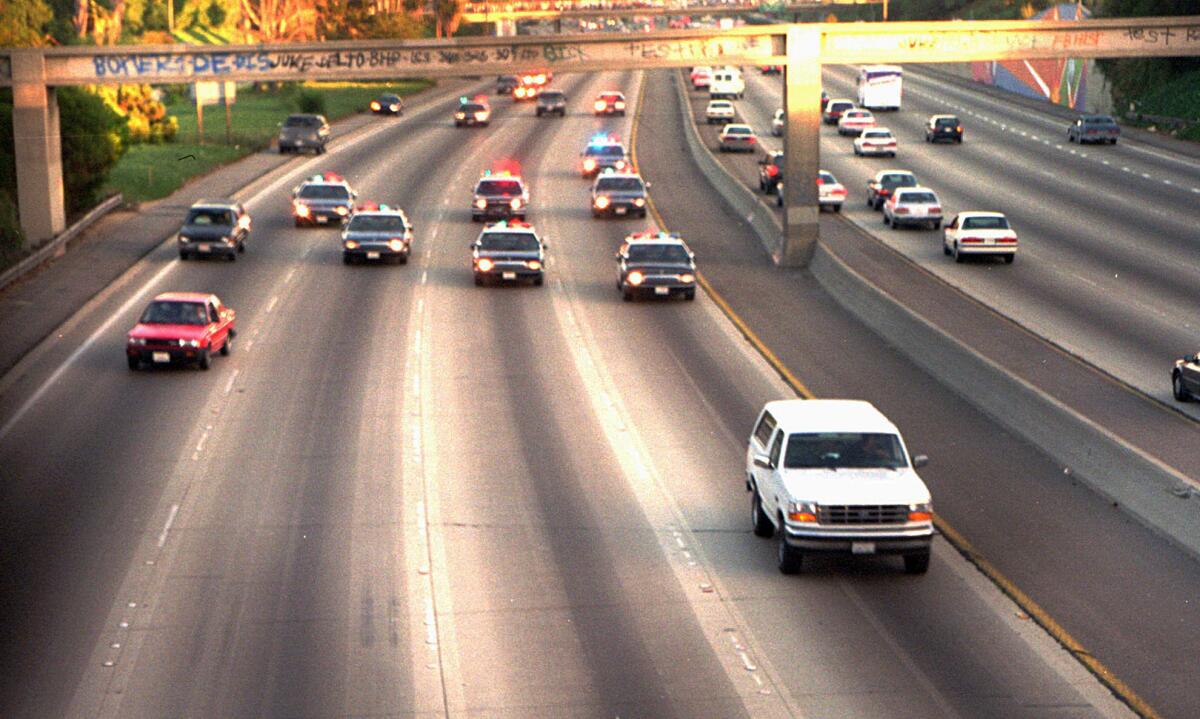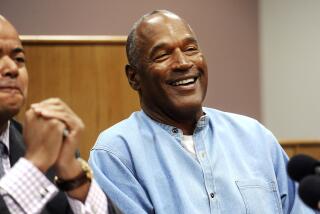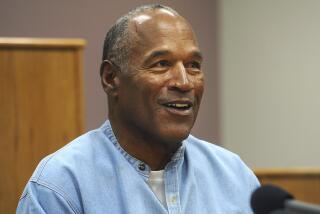The Hollywood career O.J. Simpson left behind

While O.J. Simpson’s last major on-screen gig arguably took place in a 1995 courtroom, the now-incarcerated former football player had a budding Hollywood career he left in the dust as his white Bronco sped down the 405 20 years ago.
After winning the Heisman Trophy in 1968 in his senior year at USC, Simpson picked up his first credit for an episode of “Dragnet 1967.” A non-speaking role, Simpson sat in a classroom, posing as a recruit interested in joining Sgt. Joe Friday and his team at the LAPD.
“Now there are more than 250 job opportunities in the department, and if you qualify you can apply for any one of them: forgery, homicide, motorcycle patrol, narcotics, scientific investigation and a great many others,” actor Jack Webb, as Friday, lectures to the group of recruits, including a visibly interested Simpson.
Simpson went on to juggle professional football and acting, gaining his first well-known role in the 1977 ABC mini-series “Roots,” playing an African tribesman in the first part of the grounbreaking TV adaptation of Alex Haley’s novel. That same year, he starred in the CBS TV movie “A Killing Affair,” working as one part of a detective duo alongside actress Elizabeth Montgomery. The plot: Simpson’s married character has an affair with his new female partner as they investigate a series of homicides. He hosted an episode of “Saturday Night Live” in 1978.
In a September 20, 1974 article in the Los Angeles Times, Simpson’s then-manager, Chuck Barnes, told The Times Simpson enjoys taking on different roles in movies.
“… The challenge of doing different characters is what appeals to him. He’ll do as well on the screen some day as he does now in football,” Barnes said.
Simpson retired from the NFL in 1979, taking on a series of TV movies, including 1983’s “Cocaine and Blue Eyes,” where he played a private eye in San Francisco, and in the family flick “Hambone and Hillie,” as a trucker who aids Hambone, a dog, in a cross-country adventure.
“Some no ‘count just leave you here? People like that, I just don’t understand it,” Simpson, playing “Tucker the Trucker,” says as he scoops up Hambone on the side of the freeway.
Simpson started his own film production company, Orenthal Productions, in 1979, which produced many of his TV movies, including 1979’s “Goldie and the Boxer,” a movie that received both good reviews and ratings for NBC. When asked about his current fantasy in a 1980 interview with The Times, Simpson’s aspirations had clearly moved to Hollywood.
“Winning an Oscar or an Emmy. I always put my fantasies in the realm of goals. The Oscar or the Emmy says you’ve reached a level of competence in this business, and I would love to have one.”
Simpson dived into comedy in 1988’s “The Naked Gun: From the Files of Police Squad!” with Leslie Nielsen, Priscilla Presley and Ricardo Montalban leading the cast in the first film of the series. Simpson plays Nielsen’s friend on the police squad, Nordberg, who’s in a coma. The trailer for the film plugs, “O.J. Simpson, as you’ve never seen him before.”
Simpson reprised his role in the 1991 sequel “The Naked Gun 2 1/2: The Smell of Fear” and 1994’s “Naked Gun 33 1/3: The Final Insult.”
From 1986-1991, Simpson also starred in HBO’s “1st & Ten: The Championship,” a TV series about the California Bulls, a fictional football team, and, in 1992, Simpson worked with Kris Kristofferson and Drew Barrymore in the film “No Place to Hide.”
Simpson’s last credit before he became the star of his own courtroom drama was 1994’s TV movie pilot “Frogmen,” playing John “Bullfrog” Burke, the leader of a Navy SEALs team. NBC had picked up the Warner Bros pilot but decided it would be “inappropriate” to air in light of the trial and allegations against him.
More to Read
Only good movies
Get the Indie Focus newsletter, Mark Olsen's weekly guide to the world of cinema.
You may occasionally receive promotional content from the Los Angeles Times.










